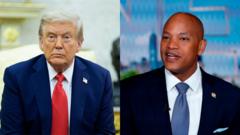An unexpected ban on wigs, hair extensions, and skin-lightening products imposed by the Grand Théâtre de Dakar sparked a national uproar, culminating in a swift reversal just a day later. The ban, initiated by theatre director Serigne Fall Guèye and endorsed by the national culture ministry, was characterized as an effort to "promote Pan-African values" and safeguard the cultural representation of Senegal. However, the decision quickly drew intense criticism and public outrage, with many viewing it as an infringement on women's autonomy masquerading under the guise of cultural preservation.
Feminist organizations and civil society representatives pointed to the memo as a reflection of the deeper gender inequalities entrenched in Senegalese society, particularly evident in the low representation of women within the leadership of President Bassirou Diomaye Faye’s cabinet. Only four women occupy positions among the 25 ministers, and the omission of a dedicated Ministry of Women has further fueled discontent regarding gender issues. Social media platforms erupted with condemnation of the ban, labeling it as paternalistic and retrograde.
The controversy is further complicated by Guèye’s political affiliations with the ruling Pastef party, noted for its anti-colonial stance and promotion of a singular notion of African identity. Critics have expressed concern that Guèye’s personal beliefs are unduly influencing a public institution that should remain neutral. “This isn’t merely about cosmetics; it’s about who defines cultural identity,” argued political analyst Fatoumata Ba, emphasizing the implications of using state mechanisms to enforce a specific cultural narrative while potentially marginalizing dissenting voices.
The ban’s most vocal opposer, feminist and cultural analyst Henriette Niang Kandé, articulated the absurdity of policing personal aesthetic choices in a viral social media post, questioning whether similar restrictions would apply to men and their grooming choices. Advocates for the ban, though fewer in number, maintain that Guèye's intentions were rooted in fostering pride rather than oppression, representing an effort to reclaim African dignity from foreign beauty standards.
Amid escalating backlash, Guèye rescinded the ban, attributing the withdrawal primarily to public misconceptions while reiterating his dedication to the theatre's objectives. Nonetheless, remnants of discontent remain palpable, particularly among urban youth who feel disillusioned by the perceived conservatism sweeping through the administration they previously supported.
The short-lived ban serves as more than just a fashionable controversy; it encapsulates overarching struggles regarding authenticity and personal rights in a post-colonial context. In a nation where skin-lightening products are widely used despite their health risks, and women's aesthetics remain subject to public discourse and scrutiny, the dialogue surrounding this issue has unveiled broader societal challenges. While the ban may have ended, the intricate debates it sparked over identity, autonomy, and cultural values are far from resolved.
Feminist organizations and civil society representatives pointed to the memo as a reflection of the deeper gender inequalities entrenched in Senegalese society, particularly evident in the low representation of women within the leadership of President Bassirou Diomaye Faye’s cabinet. Only four women occupy positions among the 25 ministers, and the omission of a dedicated Ministry of Women has further fueled discontent regarding gender issues. Social media platforms erupted with condemnation of the ban, labeling it as paternalistic and retrograde.
The controversy is further complicated by Guèye’s political affiliations with the ruling Pastef party, noted for its anti-colonial stance and promotion of a singular notion of African identity. Critics have expressed concern that Guèye’s personal beliefs are unduly influencing a public institution that should remain neutral. “This isn’t merely about cosmetics; it’s about who defines cultural identity,” argued political analyst Fatoumata Ba, emphasizing the implications of using state mechanisms to enforce a specific cultural narrative while potentially marginalizing dissenting voices.
The ban’s most vocal opposer, feminist and cultural analyst Henriette Niang Kandé, articulated the absurdity of policing personal aesthetic choices in a viral social media post, questioning whether similar restrictions would apply to men and their grooming choices. Advocates for the ban, though fewer in number, maintain that Guèye's intentions were rooted in fostering pride rather than oppression, representing an effort to reclaim African dignity from foreign beauty standards.
Amid escalating backlash, Guèye rescinded the ban, attributing the withdrawal primarily to public misconceptions while reiterating his dedication to the theatre's objectives. Nonetheless, remnants of discontent remain palpable, particularly among urban youth who feel disillusioned by the perceived conservatism sweeping through the administration they previously supported.
The short-lived ban serves as more than just a fashionable controversy; it encapsulates overarching struggles regarding authenticity and personal rights in a post-colonial context. In a nation where skin-lightening products are widely used despite their health risks, and women's aesthetics remain subject to public discourse and scrutiny, the dialogue surrounding this issue has unveiled broader societal challenges. While the ban may have ended, the intricate debates it sparked over identity, autonomy, and cultural values are far from resolved.




















